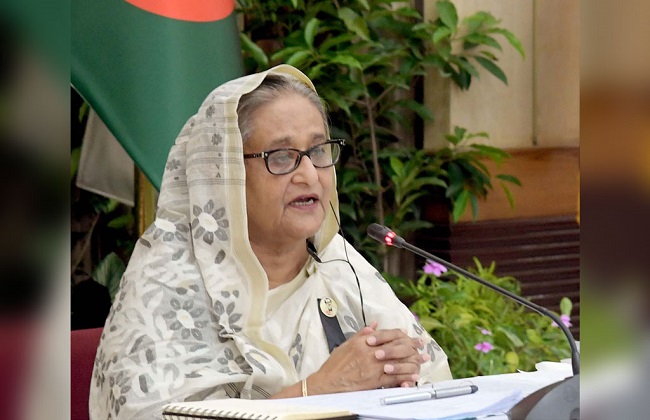
Prime Minister Sheikh Hasina has said the Covid-19 pandemic did not hit Bangladesh as hard as other countries due to prompt action to protect both the most vulnerable people and businesses.
“Bangladesh could have fallen prey to Covid-19 but we acted fast to protect both our most vulnerable people and businesses. As a result, the pandemic didn’t hit Bangladesh as hard as other countries. We’re emerging from the pandemic in a good position to continue the economic resurgence that began a decade ago,” she said in her article published in New York-based American multinational business magazine ‘Fortune’ on Monday.
The Prime Minister said, “Our approach to fighting Covid-19 was to balance lives and livelihoods, focusing on the needs of people first and then assisting the businesses that employed them.”
At the very start of the pandemic last year, the government offered relief to the ultra-poor, the disabled, seniors, migrants, and impoverished women, she said.
“We quickly distributed cash and other types of assistance to 40 million people, a quarter of the population. This came in the form of 28 separate stimulus programs totaling $22.1 billion-nearly 6.2% of our Gross Domestic Product (GDP). We spent billions of additional dollars on vaccines and other emergency measures,” she added.
“People continue to be at the heart of everything we do, whatever the Omicron variant brings,” she said, adding that the government instituted a “No One Will Go Hungry” policy that provided rice, baby food, and cash to 16.8 million families.
“We targeted payments to the aged, the disabled, and deserted and destitute women. We expanded a program inaugurated prior to the pandemic to build houses for the homeless to commemorate the centenary of the birth of my father-the founding father of the nation and its first president-Bangabandhu Sheikh Mujibur Rahman. The programme contributed immensely to our fight against the disease,” Hasina said.
She said the government also prioritized assisting small businesses and their employees. The government offered low-interest loans to small-business entrepreneurs, especially women and farmers. Government loans on favorable terms also were used to pay workers in the tourism and hospitality industries that were ravaged by shutdowns, she added.
The PM said larger businesses also received assistance: Several rounds of multi-billion-dollar payments went to employees of export-oriented companies, such as those in our vital garment-making industry.
“A working-capital loan facility was established to keep both big manufacturers and rapidly growing service firms, including information technology companies, in operation. Interest payments on these loans were split between the borrowers and the government. Interest payments on all commercial loans, in fact, were suspended for two months last year and then spread out over the next 12 months to ease the financial burden on employers,” she said.
Like other nations, Bangladesh instituted social distancing edicts, mandated the wearing of face coverings, and enforced a 66-day public holiday from late March to early June last year, the PM said.
She said industrial production slid. Small and medium-sized businesses were shuttered. Global lockdowns reduced demand and rocked our entire economy.
“However, we never lost faith in ourselves and continued to invest in our people. We set up testing facilities. We did contact tracing. We installed isolation facilities in hospitals across the country. We also recruited 6,200 doctors, 10,000 nurses, and 3,000 other key medical personnel. In the end, thanks in part to years of investments at the local level, our healthcare system was resilient despite the terrible strain,” she said.
Hasina said the combination of new initiatives and past investments has saved countless lives and allowed our economy to weather the storm. GDP growth has increased roughly by two percentage points since November last year. Bangladesh is now among the five fastest-growing economies in the world. Over the past 10 years, Bangladesh has reduced its poverty rate from 31.5% to 20.5%, she said.
“Our per capita income has trebled in a single decade to $2,227 in fiscal 2021, which is higher than our neighbors India and Pakistan. Our foreign currency reserves have reached an all-time high of $48 billion. The pandemic has failed to impede our progress,” the PM added.
“Indeed, our relentless attention to helping the people who needed help the most clearly has paid major dividends. We are especially proud that the World Economic Forum (WEF) ranks Bangladesh seventh in political empowerment of women, outpacing our regional neighbors since 2014. Our infant mortality rate has been reduced to 23.67 per 1,000. The maternal mortality rate has fallen to 173 per 100,000 live births. Bangladeshis’ average longevity has risen to 73 years,” Hasina said.
She said Bangladesh has also become a world leader in digital adoption and expertise. “Our “Digital Bangladesh” initiative has transformed and diversified the economy. It made combatting COVID-19 easier than it would have otherwise been. Average Bangladeshis now rely on their smartphones. As a result, they are kept informed minute-by-minute about pandemic developments.”
Hasina said Bangladesh has travelled a long way from being one of the poorest nations when it was founded in 1971 to achieving lower-middle-income-country status this year. “We’re on track to graduate from the United Nations’ list of least developed countries by 2026. All of this is still possible despite the worst pandemic in a hundred years. Investing in people made all the difference,” she said.
